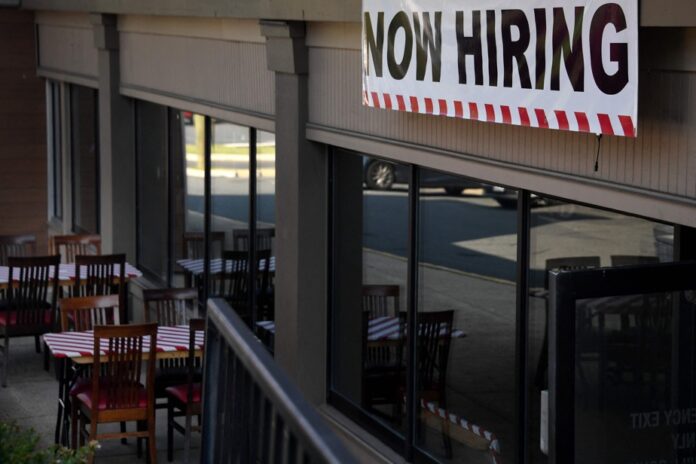(Washington) The labor market remained very solid in May in the United States, with much more job creation than expected, and a historically low unemployment rate. Wages are rising more slowly, which is good news for the fight against inflation.
“Today is a good day for the American economy and for American workers,” President Joe Biden said in a statement.
In May, 339,000 jobs were created in the United States, the Labor Department announced on Friday, when only 190,000 were expected, according to MarketWatch consensus.
Prolific sectors include professional and business services, government-related jobs, healthcare, construction, transportation and logistics, and social assistance.
In addition, the March and April figures have been revised upwards, showing 93,000 more jobs created than initially announced.
Despite these job creations, the unemployment rate increased, a little more even than expected, to 3.7% (0.3 points), when analysts were counting on 3.5%. It is at its highest since October 2022, but at a historically low level.
The movement in opposite directions of job creations and the unemployment rate is explained by the fact that these data come from two different surveys: one carried out among businesses, the other among households.
“The household survey, used for the unemployment rate, tells a very different story than the business survey, one showing weakness in employment, the other showing strength.” commented the Chief Economist of the Association of Real Estate Bankers (MBA), Mike Fratantoni.
“Job growth continues at a rapid pace, but wage pressures are not keeping pace,” said Rubeela Farooqi, chief economist for HFE, noting that average hourly wage growth “has slowed.”
This increase in wages, in fact, led the American central bank (Fed), which is maneuvering to slow down high inflation in the United States, to take a particular interest in the employment situation.
Retirements during the pandemic, childcare difficulties, but also very low immigration, have, for more than two years, led to a shortage of workers.
This prompted employers to raise wages to attract applicants and retain staff, helping to drive up inflation.
The rate of participation in the labor market remains stable, however, at 62.6%, details the Department of Labor.
In the private sector alone, job creation slowed a little in May, but remains solid, with wide disparities between sectors, according to the monthly ADP/Stanford Lab survey published on Thursday.
With much lower wage growth: “Wage-induced inflation may be less of a concern for the economy despite robust hiring,” said Nela Richardson, chief economist at ADP.
Since March 2022, to achieve its objective, the Fed has raised its key rates. This leads banks to raise the cost of the loans they offer to households and businesses, to slow down consumption and investment, and ultimately to ease the pressure on prices.
At its next meeting on June 13-14, it could choose to raise rates for an 11th time in a row, or pause to observe the effects of previous hikes and avoid dragging economic activity too low, to avoid recession.
Philadelphia Fed President Patrick Harker stressed Thursday that there “must also be a sensible immigration policy to get the people we need” into the job market.
“We just have to recognize that there are only two solutions […], bring back (into employment) more people who were on the sidelines, or bring more people into the country,” he said. -he declares.
While employers still have “difficulty finding workers across a wide range of skill levels and economic sectors,” they are seeing “easier hiring in construction, transportation, and finance,” according to this “Beige Book.” (Beige Book), an activity barometer released Wednesday by the Fed.















